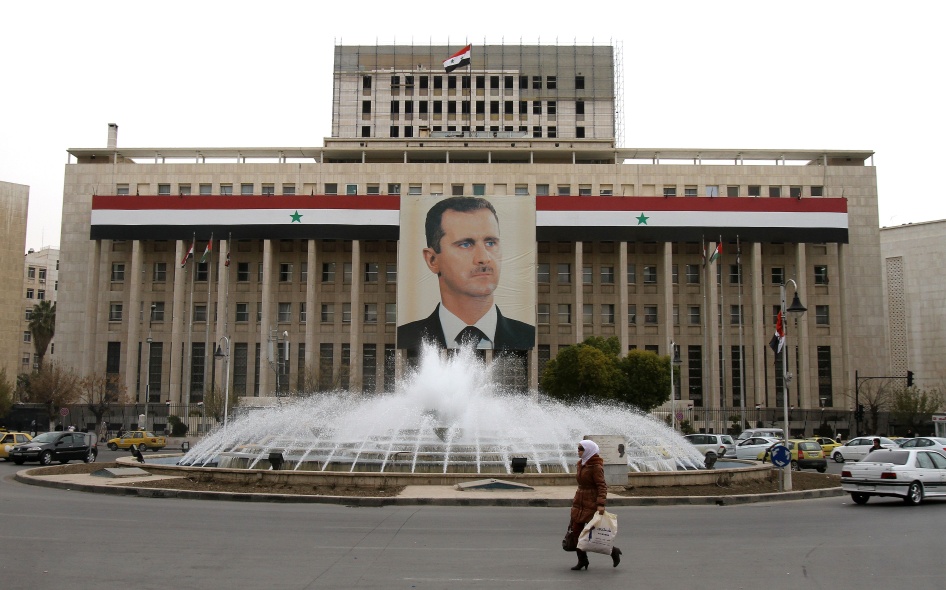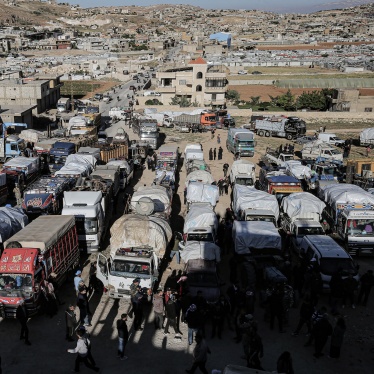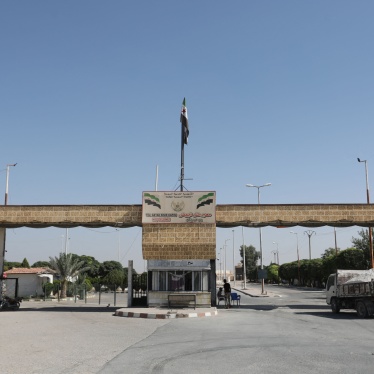(Beirut) – The Syrian Ministry of Finance has targeted, since early 2024, hundreds of people and their families from a town south of Damascus with unlawful asset freezes, Human Rights Watch said today. The en masse asset freezes constitute collective punishment and a violation of the right to property.
These decisions are based on a 2012 decree that empowers the Finance Ministry to freeze assets of individuals pending investigation for suspected terrorism under Syria’s overbroad counterterrorism law, even if they have not been charged with a crime.
“The indiscriminate nature of these mass asset freezes in Zakia appears to reflect a broader strategy of collective punishment against communities in recaptured areas,” said Adam Coogle, deputy Middle East director at Human Rights Watch. “Weaponizing counterterrorism laws to justify unlawful asset freezes and seizures is a deliberate policy aimed at maintaining a climate of fear and repression in former opposition areas.”
Human Rights Watch reviewed “precautionary seizure” decisions issued between January and June that targeted hundreds of people from Zakia, a town retaken by government forces from opposition groups in 2016. Human Rights Watch spoke with two people affected by the measures, one of whom remains in Zakia and another who was displaced to the opposition-held northwest in 2017. Those affected include the targeted individuals themselves as well as first-degree relatives, including parents, spouses, children, and siblings. For example, in one of the available decisions, out of 103 people listed, 19 were directly targeted, and 84 were their first-degree relatives.
A detailed report issued today by the Syrian Network for Human Rights (SNHR) found that out of the 818 individuals listed in the available “precautionary seizure orders” issued in 2024, 287 had previously signed documents permitting them to remain in Zakia following its recapture under the condition that they would refrain from engaging in anti-government activities. Another 196 could not be identified, 187 were internally displaced people, 69 were refugees, 37 had been forcibly disappeared, 22 were missing persons, and 20 were deceased.
One of the men interviewed said that he is among a number of opposition fighters who resisted forced displacement following the recapture of Zakia and initially declined to sign so-called reconciliation agreements with the authorities that allowed fighters to remain with their light arms after a security agency vetting process. He said that they have since verbally agreed three times to give up weapons in exchange for the release of detainees, with the authorities reneging on their promises.
“These decisions are capricious, arbitrary, vindictive, and malicious in nature,” he said, noting that he and his wife were included on the lists, as well as 19 second-degree relatives.
Both people interviewed indicated that they had not been notified of the decision to freeze their movable and immovable properties, in contravention of Syrian law. The man who remained in Zakia said he only became aware of the issue in late March, when another Zakia resident attempted to conduct a transaction involving his property at a land registry office, only to find that he was subject to an asset freeze. The other resident inquired further and found out that the orders affected hundreds of others.
The “precautionary seizure” orders analyzed are all grounded in Syria’s Law of Judicial Police Authority (Legislative Decree 63 of 2012), which empowers the Finance Ministry to freeze people’s assets as a precaution and without a court order based on requests from judicial police authorities pending investigation of “crimes against the internal or external security of the state” and crimes under Syria’s abusive Counterterrorism Law of 2012. If they are tried and convicted, their properties are then automatically confiscated and transferred to the government.
Each of the orders also referenced separate communications from the infamous Damascus-based Branch 285 of the General Intelligence Directorate. They also included a closing statement justifying the action by citing individuals’ involvement in “current events in the country.”
The former resident currently living in the northwest said he found out he had been affected after finding his name on copies of the orders circulated on a Facebook page dedicated to news about Zakia. “It included my name, my parents’ names, my siblings, names of my uncles and my cousins,” he said. “I don’t know the reason.” He said that while some of his relatives included in the order were still in Zakia, others had long been detained, or were in Turkey and elsewhere in Europe.
“I know one of the men included [in the precautionary seizure orders] who has been dead since 1988,” the Zakia resident said.
Asset freezes can severely disrupt people’s financial stability, limiting their ability to access funds, maintain property, and conduct business, thereby exacerbating economic hardships and potentially impeding their livelihoods.
“I have a piece of land, 8 dunums [about 2 acres], that I farm,” the Zakia resident said. “It was included in the asset freeze. Now I can’t sell it or rent it. They could after a while confiscate it, take it for their own. Same for my movable assets, my car, [which] I can’t do anything with now. And if I had any money in the bank, it would be the same thing, I wouldn’t be able to withdraw it.”
Neither men said they had tried to appeal or challenge the decision directly with the government. The current Zakia resident said community leaders and the town mayor sent a letter to the General Intelligence Directorate in April stating that the orders were unjust and arbitrary, but that to his knowledge they had received no response.
Human Rights Watch and the SNHR have both previously documented that the Syrian government uses an arsenal of legislative instruments to unjustly appropriate residents’ private property without due process or compensation. These include Decree 63 of 2012.
Such laws create significant barriers to return for refugees and displaced people wishing to reclaim their properties and rebuild their lives. They also complicate international reconstruction efforts, given that companies involved in demolitions or rehabilitation of structures can run the risk of contributing to human rights abuses and forced displacement if dealing with properties that were unlawfully seized by the government.
Decree 63 violates due process guarantees by not providing a means of appeal or official notification for individuals listed, Human Rights Watch said. It also violates property rights, which are protected under Article 15 of the Syrian constitution and under international human rights law.
The Universal Declaration of Human Rights and the Arab Charter on Human Rights guarantee the right to property. The Arab Charter states that no one should “under any circumstances be arbitrarily or unlawfully divested of all or any part of their property.” International courts have found the right to property and possessions protects traditional but undocumented property rights over homes and land, as well as rights documented by formal land title and registration.
Syria’s Counterterrorism Law broadly defines terrorism in a way that allows the government to label almost any act as a terrorist offense, including humanitarian aid or nonviolent protests, and lacks clear procedural standards.
By penalizing people solely based on their familial relationship with an accused person, and not based on their individual criminal responsibility, the Finance Ministry’s implementation of Decree 63 also constitutes collective punishment, which is prohibited under international humanitarian and human rights law in all circumstances.
The Syrian government should provide specific and individual reasons for freezing people’s assets and allow affected people, including relatives, to appeal the decision, Human Rights Watch said. The government should amend the counterterrorism law and other related laws to remove any overbroad definitions of terrorism and incorporate due process and fair trial guarantees.
“For refugees facing increasing pressure to return from neighboring countries and Europe, these arbitrary asset freezes highlight ongoing government retaliation and abuse, making it highly unlikely that they’ll find stability and security upon return,” Coogle said.









